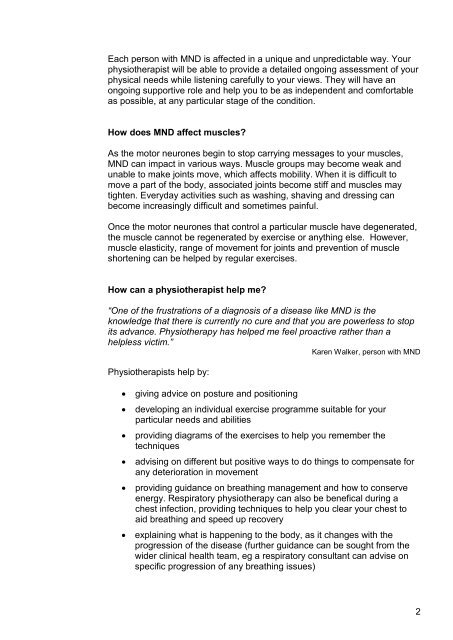Physiotherapy for people with motor neurone disease (MND)
Physiotherapy for people with motor neurone disease (MND)
Physiotherapy for people with motor neurone disease (MND)
Create successful ePaper yourself
Turn your PDF publications into a flip-book with our unique Google optimized e-Paper software.
Each person <strong>with</strong> <strong>MND</strong> is affected in a unique and unpredictable way. Your<br />
physiotherapist will be able to provide a detailed ongoing assessment of your<br />
physical needs while listening carefully to your views. They will have an<br />
ongoing supportive role and help you to be as independent and com<strong>for</strong>table<br />
as possible, at any particular stage of the condition.<br />
How does <strong>MND</strong> affect muscles?<br />
As the <strong>motor</strong> <strong>neurone</strong>s begin to stop carrying messages to your muscles,<br />
<strong>MND</strong> can impact in various ways. Muscle groups may become weak and<br />
unable to make joints move, which affects mobility. When it is difficult to<br />
move a part of the body, associated joints become stiff and muscles may<br />
tighten. Everyday activities such as washing, shaving and dressing can<br />
become increasingly difficult and sometimes painful.<br />
Once the <strong>motor</strong> <strong>neurone</strong>s that control a particular muscle have degenerated,<br />
the muscle cannot be regenerated by exercise or anything else. However,<br />
muscle elasticity, range of movement <strong>for</strong> joints and prevention of muscle<br />
shortening can be helped by regular exercises.<br />
How can a physiotherapist help me?<br />
“One of the frustrations of a diagnosis of a <strong>disease</strong> like <strong>MND</strong> is the<br />
knowledge that there is currently no cure and that you are powerless to stop<br />
its advance. <strong>Physiotherapy</strong> has helped me feel proactive rather than a<br />
helpless victim.”<br />
Karen Walker, person <strong>with</strong> <strong>MND</strong><br />
Physiotherapists help by:<br />
• giving advice on posture and positioning<br />
• developing an individual exercise programme suitable <strong>for</strong> your<br />
particular needs and abilities<br />
• providing diagrams of the exercises to help you remember the<br />
techniques<br />
• advising on different but positive ways to do things to compensate <strong>for</strong><br />
any deterioration in movement<br />
• providing guidance on breathing management and how to conserve<br />
energy. Respiratory physiotherapy can also be benefical during a<br />
chest infection, providing techniques to help you clear your chest to<br />
aid breathing and speed up recovery<br />
• explaining what is happening to the body, as it changes <strong>with</strong> the<br />
progression of the <strong>disease</strong> (further guidance can be sought from the<br />
wider clinical health team, eg a respiratory consultant can advise on<br />
specific progression of any breathing issues)<br />
2


